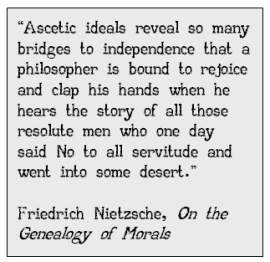WEDNESDAY, 28 JANUARY 2015
I have been fascinated for quite some time by the difference between successful and less successful people. My attention always sharpens when someone enters my attention field that I think would be a good case study – in flesh and blood, in a program on TV or in a movie. I observe how these people behave, how they enter a room, how they greet people, how they listen to other people, how they dress, even what vocabulary they use.
Twenty years ago my role model – the person I most wanted to be like – was the ascetic. I dreamed of being able to withdraw from society and to live in an abandoned fort at least three days’ walk from the nearest town – and with no easy access to any kind of vehicle.
This interest in the successful person reflects an unsurprising ambition: I want to be successful. I want to behave like a successful person; I want to talk like a successful person, think like a successful person, and over time expect to succeed when I embark on any kind of project or endeavour.
Have I finally undergone a transformation? Has the one who wanted to become an ascetic become tired of standing alone? Has he started to wonder how it would feel to be one of “them”?
The truth is, the ascetic is successful, although students and imitators of conventionally successful people won’t necessarily see it. The ascetic does not speak apologetically. The ascetic does not wear an expensive suit, but he is comfortable in the material he drapes over himself. The ascetic is not poor, though he has little money.
The ascetic is successful because he does what he wants. He goes his own way. He does not make apologies. He does not ask for acceptance. He does expect to live in peace, to feel good about who and what he is, and to finally die in peace.
Most people certainly want to be successful at the end of the day, but you have to ask yourself: successful as what, and as whom?
———————-
Read about Richard Withers, a hermit living in the “modern desert”.
______________________
